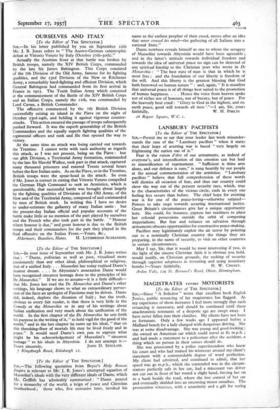OURSELVES AND ITALY
[To the Editor of THE SPECTATOR.] SIR,—In his letter published by you on September loth Mr. J. B. Jones refers to " The Austro-German catastrophic defeat at Vittorio Veneto by Italy (October 27th-3oth)."
Actually the Austrian front at that battle was broken by British troops, namely the XIV British Corps, commanded by the late Sir James Babington. This Corps consisted of the 7th Division of the Old Army, famous for its fighting qualities, and the 23rd Division of the New or Kitchener Army, a remarkably hard-fighting and efficient Division, which General Babington had commanded from its first arrival in France in 1915. The Tenth Italian Army which consisted at the commencement of the Battle of the XIV British Corps and an Italian Corps, namely the r WI, was commanded by Lord Cavan, a British Commander.
The offensive commenced by the 7th British Division successfully seizing an island in the Piave on the night of October 23rd-24th, and holding it against vigorous counter- attacks. This action ensured the passage of troops subsequently pushed forward. It was the superb generalship of the British Commanders and the equally superb fighting qualities of the regimental officers and rank and file that opened the way to victory.
At the same time an attack was being carried out towards the Trentino. I cannot write with such authority as regards this attack, as I was not present, being on the Piave : but our 48th Division, a Territorial Army formation, commanded by the late Sir Harold Walker, took part in that attack, captured many thousand prisoners and entered Trente several hours before the first Italian units. As on the Piave, so in the Trentino, British troops were the spear-head in the attack. So even if Mr. Jones is correct in stating that Vittorio Veneto compelled the German High Command to seek an Armistice, which is questionable, that successful battle was brought about largely- by the fighting qualities of Divisions of the Old Army, of the New and of the Territorial Army, composed of and commanded by men of British stock. In writing this I have no desire to under-estimate the gallantry of many Italian units : but the present-day Italian official and popular accounts of the battle make little or no mention of the part played by ourselves and the French who also took part in the battle. " Honour where honour is due," and great honour is due to the British troops and their commanders for the part they played in the final offensive on the Italian FrOnt.—Yours, &c.,










































 Previous page
Previous page